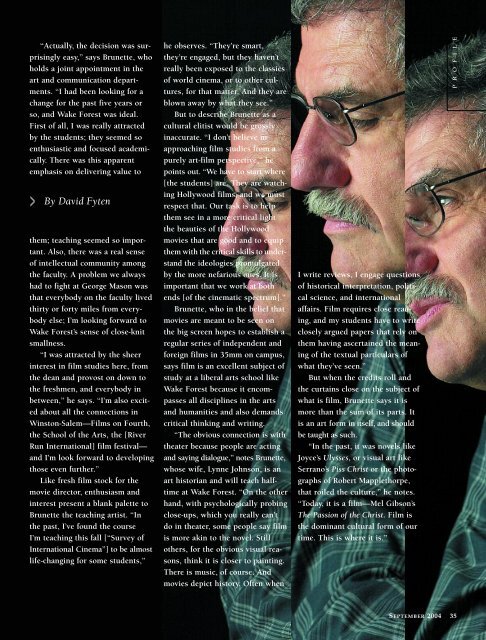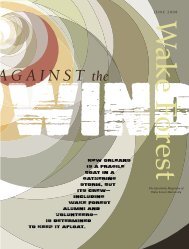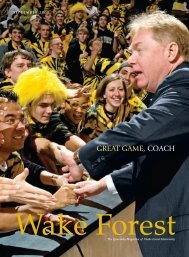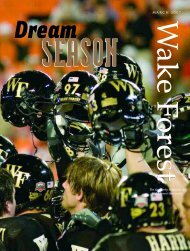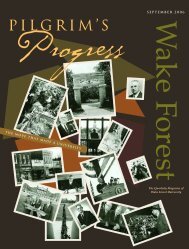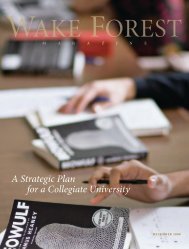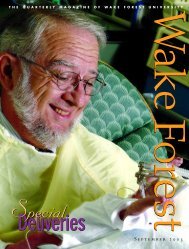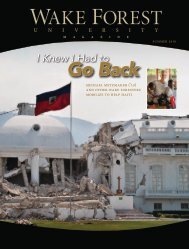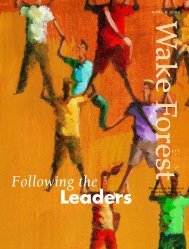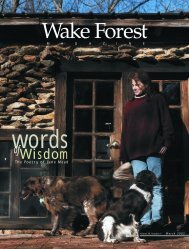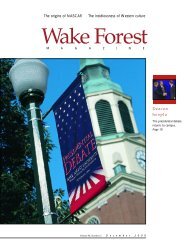Wake Forest Magazine, September 2004 - Past Issues - Wake ...
Wake Forest Magazine, September 2004 - Past Issues - Wake ...
Wake Forest Magazine, September 2004 - Past Issues - Wake ...
Create successful ePaper yourself
Turn your PDF publications into a flip-book with our unique Google optimized e-Paper software.
“Actually, the decision was surprisingly<br />
easy,” says Brunette, who<br />
holds a joint appointment in the<br />
art and communication departments.<br />
“I had been looking for a<br />
change for the past five years or<br />
so, and <strong>Wake</strong> <strong>Forest</strong> was ideal.<br />
First of all, I was really attracted<br />
by the students; they seemed so<br />
enthusiastic and focused academically.<br />
There was this apparent<br />
emphasis on delivering value to<br />
> By David Fyten<br />
them; teaching seemed so important.<br />
Also, there was a real sense<br />
of intellectual community among<br />
the faculty. A problem we always<br />
had to fight at George Mason was<br />
that everybody on the faculty lived<br />
thirty or forty miles from everybody<br />
else; I’m looking forward to<br />
<strong>Wake</strong> <strong>Forest</strong>’s sense of close-knit<br />
smallness.<br />
“I was attracted by the sheer<br />
interest in film studies here, from<br />
the dean and provost on down to<br />
the freshmen, and everybody in<br />
between,” he says. “I’m also excited<br />
about all the connections in<br />
Winston-Salem—Films on Fourth,<br />
the School of the Arts, the [River<br />
Run International] film festival—<br />
and I’m look forward to developing<br />
those even further.”<br />
Like fresh film stock for the<br />
movie director, enthusiasm and<br />
interest present a blank palette to<br />
Brunette the teaching artist. “In<br />
the past, I’ve found the course<br />
I’m teaching this fall [“Survey of<br />
International Cinema”] to be almost<br />
life-changing for some students,”<br />
he observes. “They’re smart,<br />
they’re engaged, but they haven’t<br />
really been exposed to the classics<br />
of world cinema, or to other cultures,<br />
for that matter. And they are<br />
blown away by what they see.”<br />
But to describe Brunette as a<br />
cultural elitist would be grossly<br />
inaccurate. “I don’t believe in<br />
approaching film studies from a<br />
purely art-film perspective,” he<br />
points out. “We have to start where<br />
[the students] are. They are watching<br />
Hollywood films, and we must<br />
respect that. Our task is to help<br />
them see in a more critical light<br />
the beauties of the Hollywood<br />
movies that are good and to equip<br />
them with the critical skills to understand<br />
the ideologies promulgated<br />
by the more nefarious ones. It is<br />
important that we work at both<br />
ends [of the cinematic spectrum].”<br />
Brunette, who in the belief that<br />
movies are meant to be seen on<br />
the big screen hopes to establish a<br />
regular series of independent and<br />
foreign films in 35mm on campus,<br />
says film is an excellent subject of<br />
study at a liberal arts school like<br />
<strong>Wake</strong> <strong>Forest</strong> because it encompasses<br />
all disciplines in the arts<br />
and humanities and also demands<br />
critical thinking and writing.<br />
“The obvious connection is with<br />
theater because people are acting<br />
and saying dialogue,” notes Brunette,<br />
whose wife, Lynne Johnson, is an<br />
art historian and will teach halftime<br />
at <strong>Wake</strong> <strong>Forest</strong>. “On the other<br />
hand, with psychologically probing<br />
close-ups, which you really can’t<br />
do in theater, some people say film<br />
is more akin to the novel. Still<br />
others, for the obvious visual reasons,<br />
think it is closer to painting.<br />
There is music, of course. And<br />
movies depict history. Often when<br />
I write reviews, I engage questions<br />
of historical interpretation, political<br />
science, and international<br />
affairs. Film requires close reading,<br />
and my students have to write<br />
closely argued papers that rely on<br />
them having ascertained the meaning<br />
of the textual particulars of<br />
what they’ve seen.”<br />
But when the credits roll and<br />
the curtains close on the subject of<br />
what is film, Brunette says it is<br />
more than the sum of its parts. It<br />
is an art form in itself, and should<br />
be taught as such.<br />
“In the past, it was novels like<br />
Joyce’s Ulysses, or visual art like<br />
Serrano’s Piss Christ or the photographs<br />
of Robert Mapplethorpe,<br />
that roiled the culture,” he notes.<br />
“Today, it is a film—Mel Gibson’s<br />
The Passion of the Christ. Film is<br />
the dominant cultural form of our<br />
time. This is where it is.”<br />
P R O F I L E<br />
SEPTEMBER <strong>2004</strong> 35


